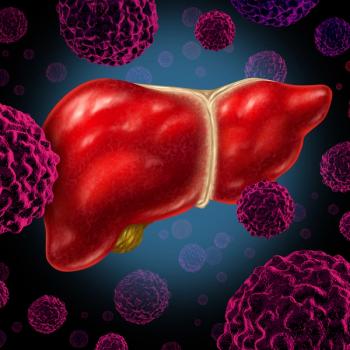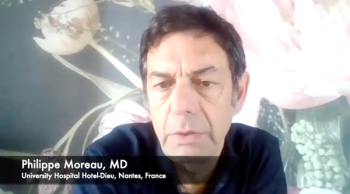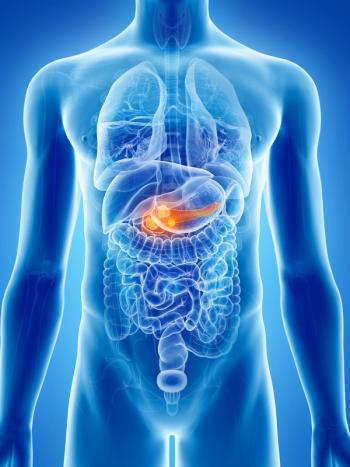
Adult patients with mantle cell lymphoma are not regularly receiving treatment recommended by clinical trial results, according to a real-world study.

Your AI-Trained Oncology Knowledge Connection!


Adult patients with mantle cell lymphoma are not regularly receiving treatment recommended by clinical trial results, according to a real-world study.

CYNK-001, a human placental hematopoietic stem cell–derived natural killer cell infusion, will now be tested in an expanded population following promising results in a phase 1 trial.

18FDG-PET was successful in identifying patients with HER2-positive early-stage breast cancer who were more likely to benefit from chemotherapy-free treatment with trastuzumab and pertuzumab.

During a discussion at 2021 ASCO, Neal D. Shore, MD, said he was most excited to see data from the phase 3 VISION trial of lutetium-177-PSMA-617 in metastatic castration-resistant prostate cancer.

An integrated review highlights the barriers standing between diverse LGBTQ populations and cancer screenings.

Data from the phase 3 JAVELIN Ovarian 200 trial indicated that avelumab with or without pegylated liposomal doxorubicin did not yield a significant improvement in overall or progression-free survival over the chemotherapy alone in platinum-resistant/refractory ovarian cancer.

The combination of cabozantinib plus atezolizumab resulted in improved progression-free survival in patients with hepatocellular carcinoma whose disease has not previously been treated vs sorafenib monotherapy.

Ferdinandos Skoulidis, MD, PhD, MRCP, details what he was most excited to learn about at 2021 ASCO.

Kathleen Moore, MD, discusses findings compiled from 3 clinical trials of niraparib in patients with ovarian cancer.

New research indicate that men with positive pelvic lymph nodes or a prostatectomy Gleason score of 8 to 10 with disease extending beyond the prostate may benefit most from adjuvant radiation therapy

Paolo Ghia, MD, PhD, discussed data from the CAPTIVATE trial of ibrutinib/venetoclax in the frontline setting for chronic lymphocytic leukemia.

Ixazomib plus daratumumab and low-dose dexamethasone yielded a high response rate and improved quality of life in frail patients with newly diagnosed multiple myeloma.

At the 2021 American Society of Clinical Oncology Annual Meeting, CancerNetwork® spoke with Tanios S. Bekaii-Saab, MD, about genomic drivers in cholangiocarcinoma.

At ASCO 2021, Chung-Han Lee, MD, PhD, discussed an ongoing trial looking at pembrolizumab plus lenvatinib as frontline therapy for non–clear cell renal cell carcinoma.

Based on positive single-agent activity in patients with non–small cell lung cancer harboring a KRAS G12C mutation, adagrasib wins FDA breakthrough therapy designation.

The Oncologic Drugs Advisory Committee has decided to wait until more results from a clinical trial of retifanlimab are available to make a final decision about approval in squamous cell carcinoma of the anal canal.

Moreau highlighted important updates in the field of multiple myeloma, including the CARTITUDE-1 trial, which yielded promising results with ciltacabtagene autoleucel and read out at the 2021 ASCO Annual Meeting.

Shaji Kumar, MD, talks about 5-year follow-up data regarding the use of daratumumab, lenalidomide, and dexamethasone in patients with multiple myeloma who are not eligible for transplant.

Patients with long-term oropharyngeal cancer were surveyed regarding factors leading to severe effects on voice and speech.

The results of a randomized control trial emphasized the need for screening methods earlier in disease but did not show a reduction in deaths for patients with ovarian and tubal cancer.

STAR-OLZ has been found to significantly reduce adverse effects of chemotherapy-induced nausea and vomiting in clinical trials.

Usmani highlighted the FORTE study as one of the trials investigating the high-risk cohort of patients.

CancerNetwork® sat down with Robert A. Figlin, MD, at the 2021 ASCO Annual Meeting to discuss the results of the KEYNOTE-564 trial with adjuvant pembrolizumab in patients with resected clear cell renal cell carcinoma.

Individuals with an early-onset colorectal cancer diagnosis had a survival benefit versus those at later ages, especially for patients younger than 50 years old.

Merck’s press release announced positive data from the KEYNOTE-826 trial investigating pembrolizumab plus chemotherapy with or without bevacizumab for patients with cervical cancer.

Usmani discussed the common adverse events observed from CARTITUDE-1, including hematologic events and cytokine release syndrome.

CancerNetwork® dissects an article from the journal ONCOLOGY® focusing on academic and community molecular profiling practices for patients with pancreatic adenocarcinoma.

All patients with chronic lymphocytic leukemia who were treated with zanubrutinib in the relapsed/refractory setting showed impressive responses.

Targovax announced the FDA granted fast track designation to its investigational agent ONCOS-102 for PD-1–refractory advanced melanoma.

Bayer seeks FDA approval for its agent copanlisib in combination with rituximab for the treatment of patients with indolent non-Hodgkin lymphoma.